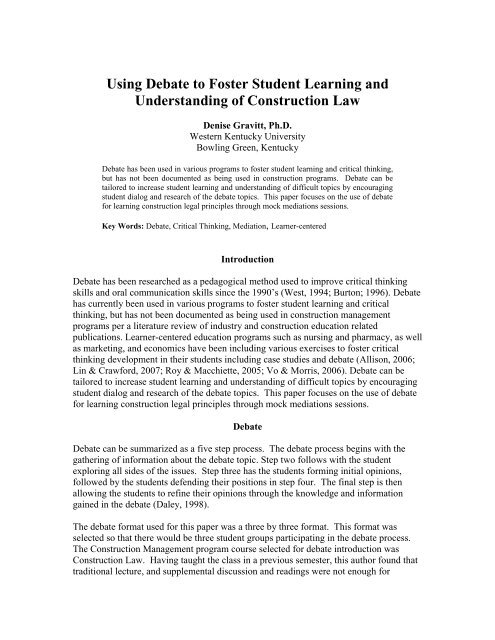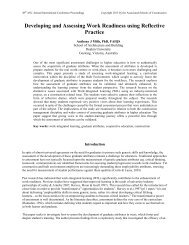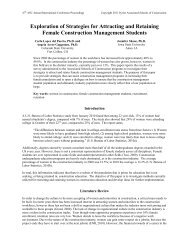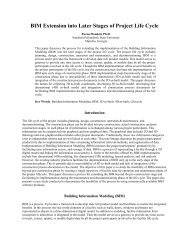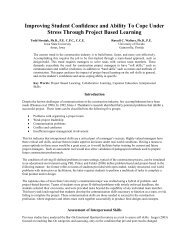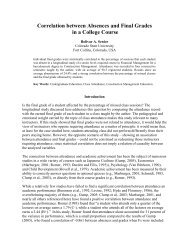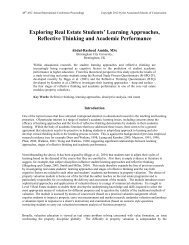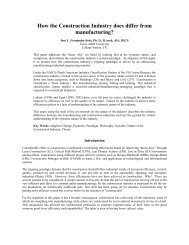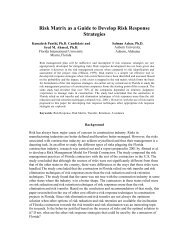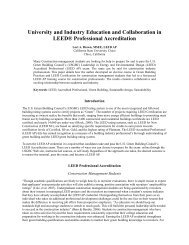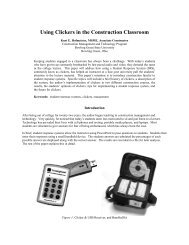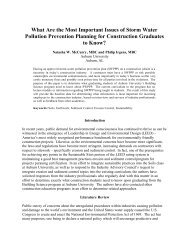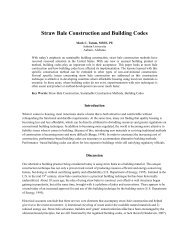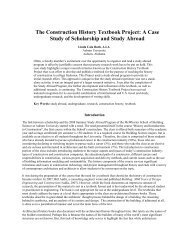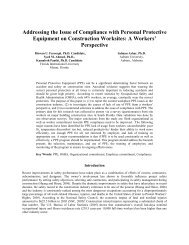Using Debate to Foster Student Learning and Understanding of ...
Using Debate to Foster Student Learning and Understanding of ...
Using Debate to Foster Student Learning and Understanding of ...
Create successful ePaper yourself
Turn your PDF publications into a flip-book with our unique Google optimized e-Paper software.
<strong>Using</strong> <strong>Debate</strong> <strong>to</strong> <strong>Foster</strong> <strong>Student</strong> <strong>Learning</strong> <strong>and</strong><br />
Underst<strong>and</strong>ing <strong>of</strong> Construction Law<br />
Denise Gravitt, Ph.D.<br />
Western Kentucky University<br />
Bowling Green, Kentucky<br />
<strong>Debate</strong> has been used in various programs <strong>to</strong> foster student learning <strong>and</strong> critical thinking,<br />
but has not been documented as being used in construction programs. <strong>Debate</strong> can be<br />
tailored <strong>to</strong> increase student learning <strong>and</strong> underst<strong>and</strong>ing <strong>of</strong> difficult <strong>to</strong>pics by encouraging<br />
student dialog <strong>and</strong> research <strong>of</strong> the debate <strong>to</strong>pics. This paper focuses on the use <strong>of</strong> debate<br />
for learning construction legal principles through mock mediations sessions.<br />
Key Words: <strong>Debate</strong>, Critical Thinking, Mediation, Learner-centered<br />
Introduction<br />
<strong>Debate</strong> has been researched as a pedagogical method used <strong>to</strong> improve critical thinking<br />
skills <strong>and</strong> oral communication skills since the 1990’s (West, 1994; Bur<strong>to</strong>n; 1996). <strong>Debate</strong><br />
has currently been used in various programs <strong>to</strong> foster student learning <strong>and</strong> critical<br />
thinking, but has not been documented as being used in construction management<br />
programs per a literature review <strong>of</strong> industry <strong>and</strong> construction education related<br />
publications. Learner-centered education programs such as nursing <strong>and</strong> pharmacy, as well<br />
as marketing, <strong>and</strong> economics have been including various exercises <strong>to</strong> foster critical<br />
thinking development in their students including case studies <strong>and</strong> debate (Allison, 2006;<br />
Lin & Crawford, 2007; Roy & Macchiette, 2005; Vo & Morris, 2006). <strong>Debate</strong> can be<br />
tailored <strong>to</strong> increase student learning <strong>and</strong> underst<strong>and</strong>ing <strong>of</strong> difficult <strong>to</strong>pics by encouraging<br />
student dialog <strong>and</strong> research <strong>of</strong> the debate <strong>to</strong>pics. This paper focuses on the use <strong>of</strong> debate<br />
for learning construction legal principles through mock mediations sessions.<br />
<strong>Debate</strong><br />
<strong>Debate</strong> can be summarized as a five step process. The debate process begins with the<br />
gathering <strong>of</strong> information about the debate <strong>to</strong>pic. Step two follows with the student<br />
exploring all sides <strong>of</strong> the issues. Step three has the students forming initial opinions,<br />
followed by the students defending their positions in step four. The final step is then<br />
allowing the students <strong>to</strong> refine their opinions through the knowledge <strong>and</strong> information<br />
gained in the debate (Daley, 1998).<br />
The debate format used for this paper was a three by three format. This format was<br />
selected so that there would be three student groups participating in the debate process.<br />
The Construction Management program course selected for debate introduction was<br />
Construction Law. Having taught the class in a previous semester, this author found that<br />
traditional lecture, <strong>and</strong> supplemental discussion <strong>and</strong> readings were not enough for
students <strong>to</strong> gain the ability <strong>to</strong> think critically with the legal principles they were being<br />
introduced <strong>to</strong> during the course. They could not always see the real industry applications<br />
beyond the example cases in the text. Thus, this course was an ideal test case <strong>to</strong> see if<br />
debate could foster the students’ underst<strong>and</strong>ing <strong>and</strong> use <strong>of</strong> the legal principals in the<br />
construction industry. Since the course selected was Construction Law, the mock<br />
mediation format was selected which allowed for Owner, Contrac<strong>to</strong>r, <strong>and</strong> Media<strong>to</strong>r<br />
teams, <strong>and</strong> additionally furthered the course coverage <strong>of</strong> alternative dispute resolution<br />
techniques.<br />
Mock Mediation <strong>Debate</strong>s<br />
The Construction Law course content was divided in<strong>to</strong> roughly three learning modules<br />
using the course text book <strong>and</strong> supplementary materials. The three learning modules<br />
were the materials covered for each <strong>of</strong> the three regular tests given during the semester.<br />
For instance, the first learning module covered basic legal principles, contract law,<br />
common law, alternative dispute resolution methods, bidding principles, construction<br />
contract language <strong>and</strong> clauses, Uniform Commercial Code, <strong>and</strong> the A/E responsibilities<br />
<strong>and</strong> authority. At the end <strong>of</strong> each module, the students were tested on the materials<br />
covered. During the week following each exam, the students participated in a mock<br />
mediation debate. The debate scenario selected for that module had <strong>to</strong> exemplify one or<br />
more aspects <strong>of</strong> the learning module <strong>to</strong>pics.<br />
The mediation debate was begun with the instruc<strong>to</strong>r finding a suitable constructionrelated<br />
case that reflected the current <strong>to</strong>pics covered in the course. This <strong>to</strong>ok as little as<br />
one day <strong>to</strong> several days <strong>of</strong> review <strong>of</strong> literature <strong>and</strong> current industry publications <strong>to</strong> find<br />
appropriate cases. Web sites such as ConstructionRisk.com <strong>and</strong> ENR’s online journal<br />
site were used <strong>to</strong> find the relevant cases. The case selected was then written with a<br />
general his<strong>to</strong>ry given <strong>to</strong> each <strong>of</strong> the three teams, <strong>and</strong> cus<strong>to</strong>mized for the Owner <strong>and</strong><br />
Contrac<strong>to</strong>r teams. The Media<strong>to</strong>rs were given all the information, including confidential<br />
data shared only with either the Contrac<strong>to</strong>r or Owner teams exclusively.<br />
This cus<strong>to</strong>mization <strong>of</strong> the cases included providing confidential information <strong>to</strong> the two<br />
opposing parties that they could use in their case debate preparation, or they could choose<br />
<strong>to</strong> not disclose the additional information. This also allowed the debate <strong>to</strong> foster<br />
discussions <strong>of</strong> pr<strong>of</strong>essional ethics <strong>and</strong> disclosure rules for different claim resolution<br />
methods. The case information needed <strong>to</strong> be distributed <strong>to</strong> the student teams sufficiently<br />
in advance <strong>of</strong> the mediation sessions <strong>to</strong> allow them <strong>to</strong> research the relevant case law, <strong>and</strong><br />
supporting cases or legal precedents in addition <strong>to</strong> preparing their team positions <strong>and</strong><br />
order <strong>of</strong> speaking for the mediation debate session.<br />
The students enrolled in the course were divided r<strong>and</strong>omly in<strong>to</strong> the three groups prior <strong>to</strong><br />
h<strong>and</strong>ing out the first mediation scenario. The students were introduced <strong>to</strong> the debate<br />
format <strong>and</strong> the mediation session procedures developed for this course. It was explained<br />
<strong>to</strong> them that this format did not follow typical industry mediation sessions, but was<br />
organized in a debate format for student learning purposes <strong>and</strong> <strong>to</strong> allow all students <strong>to</strong><br />
participate equally. The student groups rotated between being Contrac<strong>to</strong>rs, Owners, or
Media<strong>to</strong>rs in each <strong>of</strong> the three mediation debates so that they gained knowledge <strong>of</strong> being<br />
in opposing positions <strong>and</strong> saw cases from all perspectives. The students that were in the<br />
Contrac<strong>to</strong>rs team (1 st person affirmative position in debate terms) went first in presenting<br />
their position in the debates. In debates, each person on a team can speak only once,<br />
unless addressed by the Media<strong>to</strong>rs at the end <strong>of</strong> the session. The next person <strong>to</strong> speak<br />
was the 1 st negative position, or for this course, the first person speaking for the Owner.<br />
Each sequential speaker could present new information, <strong>and</strong> or rebut the previous<br />
speaker’s arguments. The Media<strong>to</strong>rs moni<strong>to</strong>red the sessions allowing only one person <strong>to</strong><br />
speak at a time, in order, with no interruptions from either party until all parties from<br />
each side had spoken. The last person from the Owner <strong>and</strong> Contrac<strong>to</strong>r teams summarized<br />
their positions <strong>and</strong> arguments for the Media<strong>to</strong>rs. Media<strong>to</strong>rs were required <strong>to</strong> take notes<br />
<strong>and</strong> pay strict attention <strong>to</strong> the cases <strong>and</strong> arguments presented during the debates. At the<br />
conclusion <strong>of</strong> the mediation debates, the Media<strong>to</strong>rs were <strong>to</strong> ask questions <strong>and</strong> interview<br />
the parties from both the Contrac<strong>to</strong>r <strong>and</strong> Owner teams.<br />
The Media<strong>to</strong>rs needed <strong>to</strong> be just as informed about the case law as the opposing parties.<br />
At the conclusion <strong>of</strong> the debate between the Owner <strong>and</strong> Contrac<strong>to</strong>r teams, the Media<strong>to</strong>rs<br />
caucused <strong>to</strong> discuss their resolution <strong>of</strong> the case. They needed <strong>to</strong> address the information<br />
provided, the relevant case law, <strong>and</strong> the information that the parties may have left out <strong>of</strong><br />
their presentations <strong>and</strong> rebuttals. The students from the Contac<strong>to</strong>r <strong>and</strong> Owner teams<br />
needed <strong>to</strong> research both sides <strong>of</strong> the case in order <strong>to</strong> be prepared <strong>to</strong> make rebuttals <strong>of</strong><br />
potential opposing team. Since each person was allowed <strong>to</strong> speak only once, the order <strong>of</strong><br />
speakers for the opposing parties was very important, with the stronger debaters going<br />
later in the sequence <strong>to</strong> allow for counter arguments.<br />
It was found that the students gained confidence <strong>and</strong> skill with the debate process with<br />
each debate. Multiple mediation debates were needed in order for the students <strong>to</strong> get<br />
familiar with the process. In the course that was the basis for this paper, three mediation<br />
debates were held. The student debate performances, as well as the depth, <strong>and</strong> clarity <strong>of</strong><br />
arguments for their mediation roles improved with each session.<br />
Grading <strong>of</strong> the mediation debate sessions occurred in two parts. The first part <strong>of</strong> each<br />
student grade was based upon the mediation debate participation, arguments or rebuttals.<br />
The second part <strong>of</strong> their grade was based upon the student research for the case. <strong>Student</strong>s<br />
were required <strong>to</strong> turn in papers that documented their research <strong>and</strong> preparation for the<br />
mediation debate after each debate citing referenced materials <strong>and</strong> cases. The overall<br />
mediation <strong>and</strong> debate session point values increased from the first session <strong>to</strong> the second<br />
based upon anticipated student learning from the first session. The first mediation debate<br />
grade was worth 50 points <strong>to</strong>tal; 25 points each for research documentation <strong>and</strong> 25 points<br />
for debate participation. The second <strong>and</strong> third mediation debates were each worth 100<br />
points <strong>to</strong>tal, again using 50% <strong>of</strong> the grade for their documented research <strong>and</strong> 50% for<br />
debate participation. The student overall semester grades were calculated based upon<br />
percentages: Tests 45%, Homework 15%, Case Reviews 10%, Mediation <strong>Debate</strong>s 20%,<br />
<strong>and</strong> Attendance/Participation 10%.
According <strong>to</strong> an informal, anonymous class survey given at the end <strong>of</strong> the semester, most<br />
students (72%) found the debates enjoyable, informative, <strong>and</strong> helpful in demonstrating<br />
the importance <strong>and</strong> application <strong>of</strong> the classroom <strong>and</strong> text materials. It was observed by<br />
the instruc<strong>to</strong>r that the students included legal terminology in class room discussion more<br />
<strong>of</strong>ten, <strong>and</strong> were more able <strong>to</strong> relate the legal principles <strong>to</strong> work experiences that they had<br />
encountered or discussed in other courses, <strong>and</strong> retained more content knowledge past the<br />
end <strong>of</strong> the semester.<br />
Summary<br />
One <strong>of</strong> the most widely documented benefits from debate is the enhancement <strong>of</strong> critical<br />
thinking skills (Colbert, 1986). The value <strong>of</strong> small group debates has been examined by<br />
others <strong>and</strong> found <strong>to</strong> be representative <strong>of</strong> a learner-centered education; additionally, it has<br />
been confirmed that debate can foster better development <strong>of</strong> skills in interpretation <strong>of</strong><br />
data (Bur<strong>to</strong>n, 1996; West, 1994). Many universities <strong>and</strong> programs are placing more<br />
emphasis on learner centered instruction, especially with the increasing number <strong>of</strong> web<br />
courses (James, 2006; Ware, 2006). The debate scenario can be used in a course <strong>to</strong><br />
demonstrate the inclusion <strong>of</strong> learner centered activities, <strong>and</strong> it can work well with<br />
traditional class room settings or with web based courses using real-time chat sessions <strong>to</strong><br />
foster student critical thinking <strong>and</strong> learning (Joung, 2003).<br />
References<br />
Allison, A. (2006). Preparing our graduates for a lifetime <strong>of</strong> learning. American Journal<br />
<strong>of</strong> Pharmaceutical Education, 70, 1, N1.<br />
Bur<strong>to</strong>n, E. J. (1996). Small group debates <strong>and</strong> the move <strong>to</strong>wards a learner centred<br />
education (Masters Thesis, University <strong>of</strong> Guelph (Canada), 1996). Masters<br />
Abstracts International, 34/06, 2147<br />
Colbert, K. (1986). The effects <strong>of</strong> CEDA <strong>and</strong> NDT debate training on critical thinking<br />
ability (Doc<strong>to</strong>ral dissertation, Florida State University, 1986). Dissertation<br />
Abstracts International 47/08, 2994.<br />
Daley, P. (1998, Oct.). Ready, read, debate! Instruc<strong>to</strong>r, 108, 3, 84.<br />
James, T. J. (2006). Creating a learning college: Perceptions <strong>of</strong> academic administra<strong>to</strong>rs<br />
(Doc<strong>to</strong>ral dissertation, University <strong>of</strong> Alabama, 2006). Dissertations Abstracts<br />
International, 68/02, 447.<br />
Joung, S. (2003). The effects <strong>of</strong> high-structure cooperative versus low-structure<br />
collaborative design on online debate in terms <strong>of</strong> decision making, critical<br />
thinking, <strong>and</strong> interaction pattern (Doc<strong>to</strong>ral dissertation, Florida State University,<br />
2003). Dissertation Abstracts International 64/10, 3652.
Lin, S., & Crawford, S. (2007). An online debate for first-year pharmacy students.<br />
American Journal <strong>of</strong> Pharmaceutical Education, 71, 1, L1.<br />
McKee, K. (2003). The relationship between debate <strong>and</strong> critical thinking with advanced<br />
placement teacher perceptions <strong>of</strong> that relationship (Doc<strong>to</strong>ral dissertation,<br />
University <strong>of</strong> South Dakota, 2003). Dissertations Abstracts International, 64/08,<br />
2766.<br />
Roy, A., & Macchiette, B. (2005, Dec). Debating the issues: A <strong>to</strong>ol for augmenting<br />
critical thinking skills <strong>of</strong> marketing students. Journal <strong>of</strong> Marketing Education,<br />
27, 3, 264.<br />
Vo, H., & Morris, R. (2006, Jul/Aug). <strong>Debate</strong> as a <strong>to</strong>ol in teaching economics: Rationale,<br />
technique, <strong>and</strong> some evidence. Journal <strong>of</strong> Education for Business, 81, 6, 315.<br />
Ware, H. b. (2006). Learner-centered e-learning: An exploration <strong>of</strong> learner-centered<br />
practices in online <strong>and</strong> traditional instruction in higher education (Doc<strong>to</strong>ral<br />
dissertation, Louisiana State University <strong>and</strong> Agricultural & Mechanical College,<br />
2006). Dissertations Abstracts International, 67/12, June 2007.<br />
West, T. L. (1994). The effects <strong>of</strong> argumentation instruction on critical thinking skills<br />
(Doc<strong>to</strong>ral dissertation, Southern Illinois University at Carbondale, 1994).<br />
Dissertations Abstract International, 56/01, 35.


